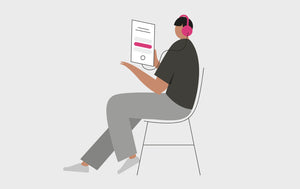7 Tips on How to Care for your Hearing Aids during summer holidays
Millions of Britons head on holiday each and every year to a variety of locations, both across the UK and abroad. Whatever destination you decide to go for, if you suffer from hearing loss, the chances are you will be taking your hearing aids on holiday too. Here, Bev Carter RHAD, Senior Hearing Aid Audiologist at Hearing Direct, shares her advice on how best to care for your devices during the summer holidays.
1. Airport security – take off your hearing aids
I’ve heard of cases when people have gone through the body scanners at airports while wearing hearing aids and it has caused the devices to reprogramme or to temporarily lose some of their settings. As a precaution, when you’re heading through airport security, pop your hearing aids in the tray along with any other electronic gadgets. This should also prevent the metal in your hearing aids from triggering any alarms in the scanner.
I would also advise packing a small goody bag of spare parts for your hearing aids and keeping this in your hand luggage so that you have it readily available. This could include a hard case for your hearing aids so that they don’t get damaged when you’re not wearing them, along with accessories such as a spare charger, wax guards, domes and batteries. Just make sure you check the security regulations with your airline, as some accessories may need to be packed in your hold luggage.
2. Keep hearing aids out of direct sunlight
Extreme temperatures can affect hearing aids and batteries, causing them to malfunction and potentially damaging them beyond repair. When not in use, your hearing devices should be kept out of direct sunlight and heat, and kept in a cool, shaded place. If you are wearing your hearing aids and you cannot avoid being in the sun, wear a brimmed hat or carry an umbrella to shade your head - and your hearing aids - from direct sunlight.
3. Use drying system – dry box - to remove moisture from your hearing aids
The heat can cause us to sweat more, creating moisture that can be harmful to hearing aids. Minimise the risk of damage by using a drying system, also known as a ‘dry box’, for your hearing aids. This will remove moisture and condensation and contains UV light radiation to inhibit the growth of bacteria. If you are exercising in the heat, remove your hearing aids beforehand if possible and store them safely in a case until you have finished to avoid any sweat from entering the components.

4. Don’t leave your hearing aids in a hot car
You should never leave your hearing aids in a hot car, as the temperature can cause a number of problems for your hearing aids, as well as shortening the battery life. When you aren’t wearing them, keep your hearing aids in your bag in a hard case when you leave the car and put them in a cool, dry place when you get to your destination.
5. Clean the earwax more frequently
In hot conditions, we produce more earwax than usual, so you may find that you need to clean your hearing aids a little more frequently in the summer to keep them performing at their best.
6. Remove your hearing aids before cooling down in a pool
If you’re tempted to cool down in a paddling pool, swimming pool or open water during the heatwave, remove your hearing aids beforehand and store them in a cool, dry place. Hearing aids are not usually waterproof, so it is important to protect them from moisture.
7. Guard against ear infections
Swimming in dirty pools, rivers or open water can pose an infection risk and it’s not always easy to tell whether the water is contaminated. Avoid putting your head under water and wear earplugs when swimming anywhere - whether in the UK or overseas - to keep this risk to a minimum. And don’t forget to remove your hearing aids before swimming to avoid any water damage to them.
Author: Bev Carter RHAD, Senior Hearing Aid Audiologist


